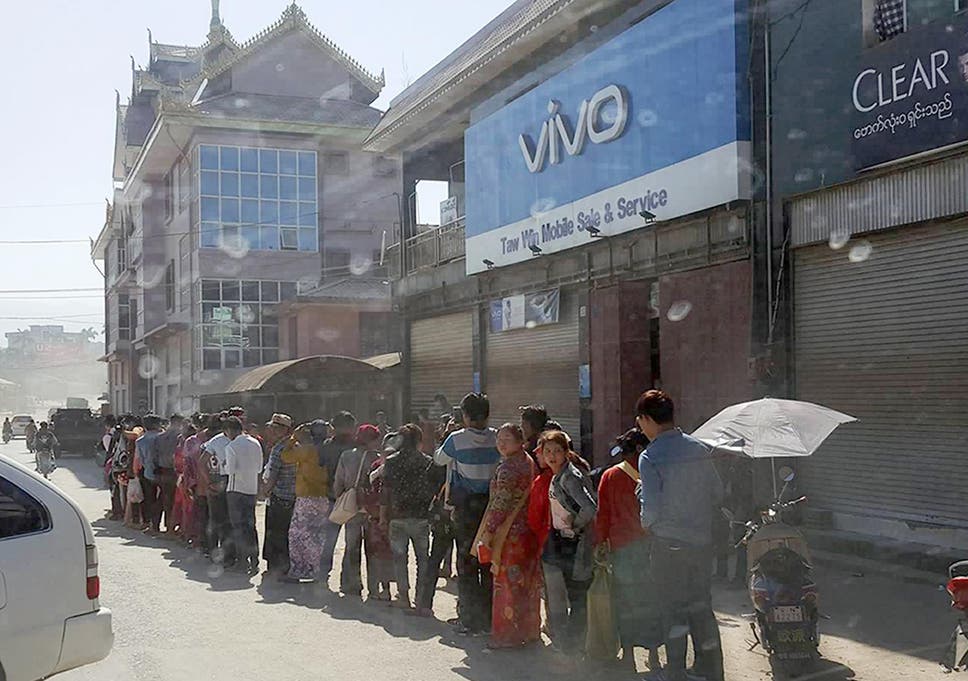Trafficking in Chinese Brides
"We trusted them. I had a sense I was being sold, but I could not escape."
"I said I didn't want to get married. I wanted to go home."
"When I saw Burmese letters on the signs, I was so happy [on her return to Myanmar]."
Phyu, 17, Burmese trafficked to China as a 'bride'
"The families of the husbands are mad about the case because they spent a lot of money but lost their wives."
Niu Tianhui, spokesman, Xiangcheng police bureau
"Bride trafficking is very common here in Shan State."
Zaw Min tun, member, anti-human-trafficking task force, northern Shan
"[Her baby, 9 days old, looks] like her father. The same lips. Chinese."
"I wanted to give her away but I looked at her and I loved her."
"Even with that Chinese animal's lips."
Nyo, 17, Burmese trafficked to China as a 'bride'
 |
| The Human Rights Watch report found vulnerable young women from Myanmar’s conflict-ravaged northern Kachin and Shan states are being trafficked into sexual slavery in China ( AFP/Getty ) |
Two schoolgirls, good friends, lured by a neighbour, Daw San Kyi, promising them well paid waitressing employment if they would travel to the border with China. He knew a wealthy villager who would assist them, so early one morning a year ago, a van arrived to pick them up and take them to the identified destination. There was a long drive on a mountain road that made Phyu nauseated. Four pills given her by Ms. San Kyi helped, leaving Phyu disoriented, but she recalled that someone used a syringe to inject her arm with a substance.
Her friend Nyo, also 16 years old, refused pills and she recalls some of what occurred but her memory too is confused. There were guesthouses along the border where they stopped and there they were informed that heavy rain had closed the area and the roads closest to the restaurant where work awaited them. A boat ride ensued and then additional car travel. They were a full ten days in transit and by then it seemed that the restaurant promise was nowhere in sight. The girls attempted to free themselves and run home but failed.
They were in a strange place with a strange language and had no idea where they were, where they could run to. Chinese-speaking men arrived to look at them. Some of them pointed at Phyu, others at Nyo. When Phyu began crying, the trafficker said she must stop otherwise she would not look pretty enough to attract a potential husband. The girls were taken separately and paired each with a 'husband'. They thought they might be in Beijing.
Phyu was locked into a room by her 'husband' Yuan Feng, 21. Yuan would arrive in the evenings, inject something into her arm and force sex on her. Nyo was also locked in a room by her 'husband' Gao Ji; she was beaten. Once he began to trust her he allowed her to use social media and that is how she discovered that she was in Xiangcheng County, Henan Province, one of China's most populous provinces, with 100 million people, double the population of Myanmar.
Henan Province has one of the widest gender disparities in China, thanks to the gender-based abortions forced on Chinese for 30 years with their one-child policy, with the emphasis on boy babies, and where female babies were aborted or abandoned. Now that the boy babies are grown there are no female counterparts for them, leading Chinese men to import wives from countries nearby, forcibly if need be.
Phyu, it turned out was in Xiangcheng as well. A Shan Chinese woman who helped to rescue girls such as Nyo and Phyu from sexual slavery in China alerted a police officer and two months after the girls' arrival in Xiangcheng, police knocked on their husbands' doors. The law mandated that Mr. Yuan and Mr. Gao be detained for 30 days. Giving the girls the opportunity to leave and weeks later they returned to Mongyai, Myanmar.
Nyo was pregnant, and she decided the child would be given up for adoption. And when the baby was born she was unable to part with the tiny girl.
 |
| Photograph, Minzavar, The New York Times |
Labels: Brides, China, Myanmar, Sex Slaves

<< Home